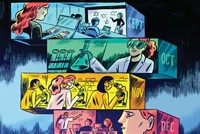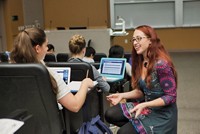Advertisement
Grab your lab coat. Let's get started
Welcome!
Welcome!
Create an account below to get 6 C&EN articles per month, receive newsletters and more - all free.
It seems this is your first time logging in online. Please enter the following information to continue.
As an ACS member you automatically get access to this site. All we need is few more details to create your reading experience.
Not you? Sign in with a different account.
Not you? Sign in with a different account.
ERROR 1
ERROR 1
ERROR 2
ERROR 2
ERROR 2
ERROR 2
ERROR 2
Password and Confirm password must match.
If you have an ACS member number, please enter it here so we can link this account to your membership. (optional)
ERROR 2
ACS values your privacy. By submitting your information, you are gaining access to C&EN and subscribing to our weekly newsletter. We use the information you provide to make your reading experience better, and we will never sell your data to third party members.
Education
East-West Partnership
Hanoi University of Science and University of Illinois collaborate to modernize Vietnamese chemistry curriculum
by Celia Henry Arnaud
May 31, 2010
| A version of this story appeared in
Volume 88, Issue 22

James Lisy taught his first class at Hanoi University of Science (HUS) in August 2007. He was there to teach chemistry to some of the best students in Vietnam, three lectures per day, five days per week, for two weeks.
"It was unbelievably hot and humid," the University of Illinois, Urbana-Champaign, chemistry professor says. The air-conditioning came on only five minutes before class started at 8 AM. "By the end of the first lecture, I was literally drenched in sweat," Lisy adds.
Lisy was astonished by the weather but amazed by his students. "I gave the students the exact same material that the students at Illinois would get," Lisy says. He taught the course—the equivalent of Illinois' semester-long honors general chemistry class—in English in only two weeks and gave the students the same exams he used at Illinois. The Vietnamese students "did amazingly well," he says.
Lisy is in the vanguard of a program by which Vietnam intends to raise its higher education to international caliber. To do this, the Vietnamese are forming partnerships with universities around the world to implement their curricula at Vietnamese universities. The advanced chemistry program at HUS is among the first of these experimental education programs being funded by Vietnam's Ministry of Education & Training. The programs must import a curriculum from an international university of high standards, must be taught in a language other than Vietnamese, and must involve overseas professors, says Luu Van Boi, dean of the faculty of chemistry at HUS.
The HUS faculty knew immediately that they wanted their program to be in English, but choosing a partner took some time. "We considered about 20 universities from the U.S., the U.K., New Zealand, and Australia," Boi says. The faculty agreed on a U.S. university. "We feel education programs in the U.S. are intensive but not overloaded, finely balanced between theory and practice," he says.
Opportunities to influence an entire country's undergraduate chemistry curriculum don't come along every day. When officials from HUS approached the chemistry department at the University of Illinois, Urbana-Champaign, to do just that, the Illinois chemists jumped at the chance.
"One of the motivating factors was the idea that we would have this enormous impact on a country," says Steven C. Zimmerman, head of the Urbana-Champaign chemistry department. The idea was to replicate the entire Illinois chemistry curriculum at HUS. When the curriculum was well established there for students in the advanced chemistry program, it would be rolled out for the other chemistry students at HUS and other universities in Vietnam. "The idea that Illinois chemistry would be taught in every major university in an entire country was cool," Zimmerman says.
Students face a tough selection process to get into the program, Boi says. They must pass the national college entry examination with superlative marks in mathematics, chemistry, and physics. Priority is given to students who have received medals in the International Chemistry Olympiad. The students must score well on the TOEFL (Test of English as a Foreign Language), and even then they receive a year of intensive English instruction before starting the Illinois chemistry curriculum.

Lisy's class at HUS was the first in an ongoing series. Other members of the Urbana-Champaign faculty, including Patricia A. Shapley, Anne M. Baranger, Martin Gruebele, and Alexander Scheeline, have since gone to Vietnam to teach other courses in the university's chemistry sequence. So far, they have taught two semesters of general chemistry and one semester each of organic, analytical, inorganic, and physical chemistry in Vietnam. Each class has been almost as accelerated as that first general chemistry class. Lisy taught the first semester of physical chemistry—quantum mechanics—in three weeks. "You can just imagine what that did to their minds," he says.
"Taking courses in a short time is a challenge for me," says Thanh Phuong Dao, a student in the program. "To get good marks, I must organize lecture notes, do homework, and prepare for the next lecture in only one night. I always wish I had more time to review other sources of materials."
Because the Vietnamese students don't have exam repositories like the fraternity "scoop files" found at many U.S. universities, the professors have been able to use identical materials at Illinois and HUS. "You can make a quantitative comparison," Gruebele says. The Vietnamese students have consistently outperformed the Illinois students. Gruebele cautions, however, that "the initial students are not representative of the Vietnamese chemistry student population."
The classes have been so compressed because the Illinois faculty can't abandon their responsibilities at home for a whole semester. Starting this past semester, they introduced a webinar format, in which each traditional lecture is divided into three or four short webinars. Faculty partners at HUS downloaded the webinars, played them in class, and led discussions about them. The Illinois professors held virtual office hours with the students through electronic means such as e-mail and Skype. At the end of the semester, the Illinois professors flew to Hanoi to give lectures and administer the final exams. "This way, the students can get the material at a much more leisurely pace," Lisy says.
Dao is studying the second semester of physical chemistry in the webinar format. "The webinar form makes me have longer to study," she says. She notes, however, that sometimes the individual lectures still go faster than she would like.
The webinar approach is also easing the Vietnamese faculty into teaching the Illinois curriculum. Part of the program has focused on introducing the Vietnamese professors to U.S. teaching methods. So far, 20 of the Vietnamese faculty members have spent three months at Illinois, where they attend chemistry lectures and take courses at Urbana-Champaign's Intensive English Institute.
"The idea that Illinois chemistry would be taught in every major university in an entire country was cool."
The program encourages the Vietnamese faculty to adopt modern, inquiry-based teaching styles rather than just reading from a textbook. As the professors become more comfortable with the approach, they will introduce the curriculum to the chemistry students not in the advanced program, perhaps in Vietnamese instead of English.
"There's nothing wrong with teaching chemistry in Vietnamese, as long as you teach modern topics, make it inquiry-based, and do the things that we know help student learning and retention," Gruebele says. "These classes will be taught by Vietnamese faculty to the regular chemistry class, and they will probably be in Vietnamese."
The program is making less of an impact on the laboratory portion of the curriculum. Illinois' laboratory program uses equipment that the Vietnamese university doesn't have. HUS bases its laboratory program on the Illinois program but introduces its own experiments. "Every time we have new equipment, we update the program accordingly," Boi says.
Although the program is focused on the lecture portion of courses, some of the Vietnamese students have gone to Illinois to participate in summer research projects. "They get a very different impression of chemistry—that it's not just something you read from a textbook and memorize," Gruebele says.
The first cohort of students is approaching the end of the program. "Some of these students are well-enough prepared in both the language and the chemistry that they'll get into good universities," Gruebele says. "There are people I would unhesitatingly make a Ph.D. offer to to come to Illinois."
The goal is to have the program reach the entire Vietnamese chemistry curriculum, however. "If I thought all I'm doing is teaching 30 or 40 elite students for a few years and that's the end of it, it wouldn't really be worth it in the long term," Gruebele says. As the early cohorts of students move through the program and on to graduate school, the hope is that they might one day return as professors themselves to push educational reform even further.





Join the conversation
Contact the reporter
Submit a Letter to the Editor for publication
Engage with us on Twitter